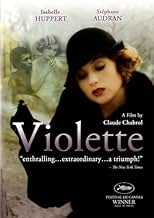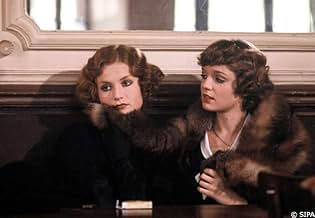VALUTAZIONE IMDb
7,1/10
2601
LA TUA VALUTAZIONE
Aggiungi una trama nella tua linguaIn an interwar France struggling with profound social and political change, 18-year-old Violette Noziere rebels against the constraints of her claustrophobic, working-class (and possibly inc... Leggi tuttoIn an interwar France struggling with profound social and political change, 18-year-old Violette Noziere rebels against the constraints of her claustrophobic, working-class (and possibly incestuous) family, with troubling consequences.In an interwar France struggling with profound social and political change, 18-year-old Violette Noziere rebels against the constraints of her claustrophobic, working-class (and possibly incestuous) family, with troubling consequences.
- Premi
- 2 vittorie e 5 candidature totali
Stéphane Audran
- Germaine Nozière
- (as Stephane Audran)
Greg Germain
- Le musicien noir
- (as Grégory Germain)
Trama
Lo sapevi?
- QuizThe first time that director Claude Chabrol worked with actress Isabelle Huppert. They would later work together on: Un affare di donne (1988), Madame Bovary (1991), Il buio nella mente (1995), Rien ne va plus - Il gioco è fatto (1997), Grazie per la cioccolata (2000), and La commedia del potere (2006).
Recensione in evidenza
In 1978, when Claude Chabrol made 'Violette Noziere', many people in France remembered very well the criminal case of the woman who gives the film its name. It had been one of the scandalous, passionate, and morbid stories of the interwar period, a story that competed on the front pages of Parisian newspapers in 1933 with the news about Adolf Hitler's rise to power in Germany, and which had divided the French public opinion into two camps, as no another sensational affair had since the Dreyfus case. The heroine of the gloomy story was a 16-year-old girl from a working / mid-class neighborhood, who had poisoned her parents. The father had died but the mother survived. The investigation revealed the double life of a girl suffocated by the environment in which she lived, considered a sinister criminal by some and a victim of social conditions and a perverse family environment by others. However, Chabrol only mentions in passing the media scandal around this case, being rather fascinated by the young woman's personality and also fascinating his spectators in the way he tells the story of the crime and the circumstances that led to its committing.
The whole film revolves around the heroine played by Isabelle Huppert. The script is quite faithful to the story, presents the facts as reported by the press of the time and does not try to serve surprises or insert speculative interpretations about the reasons for the actions and the psychological sources of the acts committed by the young woman. The director's attention is focused on reconstructing the confined and devoid of personal separation in which the Noziere family lives, the bohemian environment in which the young high school girl spends her time in the company of students, crooks, and old bourgeois who take advantage of the youth of girls in need for money or sensations. Rejecting both moral judgments and psychoanalytic interpretations, Chabrol lets Isabelle Huppert build the role of the girl who, instead of teenage dreams, plunges into promiscuity, and who travels from adolescent rebellion to murder with an impassive coldness. We don't find too many reasons in the film that would put us as spectators in the camp of Violette's supporters, except for the personality of the actress who fills the role with gloomy feelings and self-destructive tension.
Isabelle Huppert achieves with the part of Violette in this film one of the first great roles of a fabulous career. She is supported by Stéphane Audran (the director's second wife, whom he would break up after 14 years of marriage and many remarkable films in the same year 1978) and Jean Carmet, one of those talented French actors whom Chabrol was giving the opportunity of consistent parts even if they were not first rank stars. A special award should be given to those who recognize Fabrice Luchini in one of the first roles of his film career. The style of the story is interesting and elaborate, temporally separated frames continue visually one another, flashbacks and imaginary scenes (especially from Violetta's fantasies or nightmares) are interleaved nervously and non-linearly, but perfectly following the logic of the action. 'Violette Noziere' manages to describe the interwar social environment, with social contradictions, moral prejudices, inequalities and stigmas related to the status of women and the pressure of the press of sensation. The film also intents to be a psychological study into the motives of the crime. Here, I think intentionally, the answer is not clear. We are shown the conditions that can generate crime, but not the gates that open between reality and horror. Judgments belong to us, the spectators.
The whole film revolves around the heroine played by Isabelle Huppert. The script is quite faithful to the story, presents the facts as reported by the press of the time and does not try to serve surprises or insert speculative interpretations about the reasons for the actions and the psychological sources of the acts committed by the young woman. The director's attention is focused on reconstructing the confined and devoid of personal separation in which the Noziere family lives, the bohemian environment in which the young high school girl spends her time in the company of students, crooks, and old bourgeois who take advantage of the youth of girls in need for money or sensations. Rejecting both moral judgments and psychoanalytic interpretations, Chabrol lets Isabelle Huppert build the role of the girl who, instead of teenage dreams, plunges into promiscuity, and who travels from adolescent rebellion to murder with an impassive coldness. We don't find too many reasons in the film that would put us as spectators in the camp of Violette's supporters, except for the personality of the actress who fills the role with gloomy feelings and self-destructive tension.
Isabelle Huppert achieves with the part of Violette in this film one of the first great roles of a fabulous career. She is supported by Stéphane Audran (the director's second wife, whom he would break up after 14 years of marriage and many remarkable films in the same year 1978) and Jean Carmet, one of those talented French actors whom Chabrol was giving the opportunity of consistent parts even if they were not first rank stars. A special award should be given to those who recognize Fabrice Luchini in one of the first roles of his film career. The style of the story is interesting and elaborate, temporally separated frames continue visually one another, flashbacks and imaginary scenes (especially from Violetta's fantasies or nightmares) are interleaved nervously and non-linearly, but perfectly following the logic of the action. 'Violette Noziere' manages to describe the interwar social environment, with social contradictions, moral prejudices, inequalities and stigmas related to the status of women and the pressure of the press of sensation. The film also intents to be a psychological study into the motives of the crime. Here, I think intentionally, the answer is not clear. We are shown the conditions that can generate crime, but not the gates that open between reality and horror. Judgments belong to us, the spectators.
I più visti
Accedi per valutare e creare un elenco di titoli salvati per ottenere consigli personalizzati
- How long is Violette?Powered by Alexa
Dettagli
- Data di uscita
- Paesi di origine
- Lingua
- Celebre anche come
- Violette
- Luoghi delle riprese
- Rue Santos-Dumont, Paris 15, Parigi, Francia(Violette and Jean in the street, making plans)
- Aziende produttrici
- Vedi altri crediti dell’azienda su IMDbPro
Botteghino
- Budget
- 1.360.000 CA$ (previsto)
Contribuisci a questa pagina
Suggerisci una modifica o aggiungi i contenuti mancanti

Divario superiore
By what name was Violette Nozière (1978) officially released in India in English?
Rispondi

































